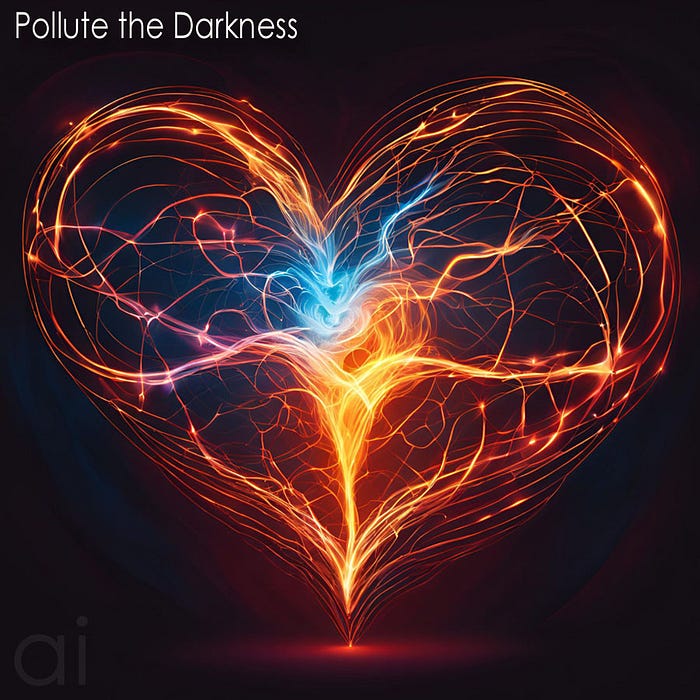
However, cardioversion stories are not always that simple. When first responders arrive on scene, they’re often using a defibrillator to deliver a shock to a stopped heart through handheld paddles. This is a common first step in emergency response. The result worldwide is that we have a tremendously large population that would have died otherwise, and a portion of those that actually went towards the light and were pulled back into their bodies.
Not everyone with an NDE experience talks about it or records it, but there are, piling up day by day, an impressive amount of stories coming out of these experiences. For the most part they all start the same way and that beginning is why I think we should just live like we’re dead already. The person sees a light, walks into it with or without a guide, and experiences love. Gone is angst, anger, worry, sorrow, fear, and hate. Present is love. They report being filled with joyful love — and only joyful love.
So where did it go, all that angst, anger, worry, sorrow, fear, and hate? Obviously the person still exists without their body. Too many are reporting the same story so the old idea that our brains have one last psychedelic mind trip before we die for good is becoming an outdated philosophy. It’s too unbelievable that so many would have an identical cosmic brain odyssey.
Let’s strip it down to just two things we’re discovering from the accumulating mound of stories. 1) We still exist outside of our bodies. 2) Apparently, angst, anger, worry, sorrow, fear, and hate are not part of who we are. We leave that in our biological body. Rather, angst, anger, worry, sorrow, fear, and hate are biological responses we have — like a sneeze. Those emotions are part of our bodies, not part of us.

The more I studied NDEs, the more I understood that those negative emotions were part of my biological state, the more I was smacking my forehead and thinking, Why don’t I just live like I’m dead already? Could I actually skip those emotions? Were my emotions like a menu and I could just opt out of the green beans of worry by not ordering that side dish?
Opting out of negative emotions is a skill you have to develop. Like riding a bike, we’re not born doing it. For example, even a baby has separation anxiety as soon as his brain develops enough. When a toddler is melting down in a store because he can’t have what he wants, his sorrow is real. And as he wails out the song of his people so the entire store can hear it, he is having a biological response to an unfulfilled desire.
And here we have to add in what I call the ping effect. It’s actually from a wondrous and helpful part of our biological body called the mirror neuron. In the frontal lobe of your brain this little neuron is the reason your body will execute a yawn when you see someone else yawn. It’s also the reason why you feel sad when you see someone sad, cry when you see someone cry, feel agitated when you see someone angry, and why you cannot suppress a grin when you see someone laughing whole heartedly.
The mirror neuron is a helpful little beast. We don’t all have to figure out how to create the wheel. Rather, we can watch one person figure it out and then we all know and can then move onto developing wagon axels. It’s the great helper of human kind’s progression and can also be the great destroyer of relationships and the beginner of wars.
Back to the mother in the store with the wailing toddler. She is probably not smiling. Add on the ping effect she’s getting from the toddler’s emotional state things like embarrassment and impatience (also non-existent outside of our bodies) and I can guarantee she’s not having a positive experience in aisle 9.
There is no way we can avoid the ping effect so long as we live in a realm with other humans. In recent years a common science experiment for youngsters is to have two plants and speak negatively to one and lovingly to another. Over a period of time, the one will thrive and the other will begin to wilt and become sickly. Also popular is the jar of cooked rice experiment where one jar that is sent positive thoughts will stay pristine and un-moldy and the other that has had negative thoughts blasted at it daily will mold. That’s right, we have invisible thoughts and words whizzing all around us from our fellow beings and, like a plant or a jar of rice, those invisible messages can ping us. It’s unavoidable. The game is not to wilt.
This is where that skill development comes in handy. If we can pause in any given moment of negative emotion and strip ourselves down to our divine self, the self that can set down this body and still exist in a higher and holier state of love and joy, we can walk amongst the briars and not get snagged.
This is not a breaking newsflash. You can see it in certain cultures, already strong and thriving. In Indian culture and yoga practices the deeper spiritual meaning of the Sanskrit word Namaste is, “The divine in me honors the divine in you.” Many outside of India are adopting the namaste philosophy to encompass a sense of peace, mindfulness, and connection to their environment and fellow beings.

“I’m going to set down this body reaction and tune into my higher self to navigate this situation with love and respect for the divine around me,” is a good skillset if you want to be happy. It’s the business of NOW. It’s the business of realizing the moment you’re in and living the moment you’re in ON PURPOSE.
We can even strip down the difficult people in our lives to their divine selves, knowing that someday we will stand with them on the other side of the veil and feel good being around them as we are filled with love together. Those difficult people are useful in our self-development journeys. Rhonda Byrne calls these people P.E.T.s, personal emotional trainers. A paradigm shift of looking at the angsty person in front of you and shifting from seeing them as a festering obstacle to seeing them as a beneficial, emotional trainer is most helpful. Suddenly you shift from your emotional body to your divine self and you can gamify your interaction, evaluating your body responses and your expressed responses to see if your skill is increasing.
Here are some basic techniques to help you opt out of body-emotions and into your higher state of joyful love:
- Practice being present in the NOW because it’s the only thing that is real.
- Acknowledge that part of your negative emotional responses are from your overly-helpful mirror neuron.
- View difficult people around you as emotional trainers to shift you into divine shape.
- Remember your divine being and know that your real self isn’t as upset about this as your body-self is.
- Think on a celestial plain, putting into perspective the tribulations you are passing through in this body.

But we don’t want to get too dead about it. One thing we’re discovering from the accumulating collection of NDE accounts is that we very much wanted to come to earth to have an experience in these emotional bodies in this realm. We planned to be here. We wanted to be here. There was something we knew there about being here that made what we would learn in this earthly existence our greatest desire. We just can’t remember it right now. If we leave on purpose and willfully abandon these bodies we will miss out on why we came. We need to trust and honor our divine selves and stick with this mortal experience so we can learn and grow. Cultivating the skill of thinking a little higher, remembering who we really are, and navigating our nows more meaningfully will build a string of todays that amount to a heaping lifetime of more happiness and joy.
Comments
Post a Comment